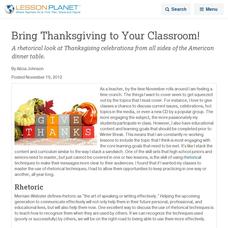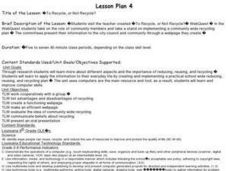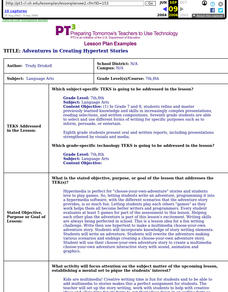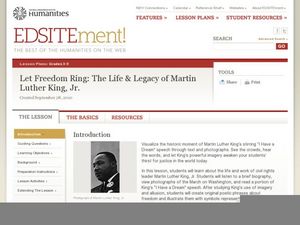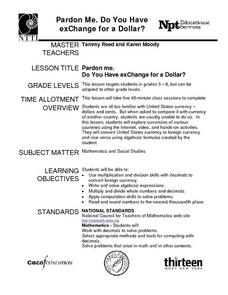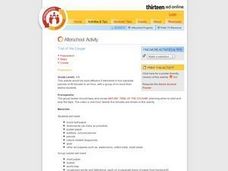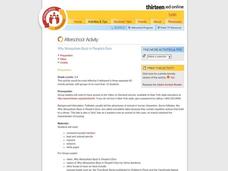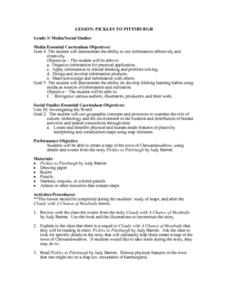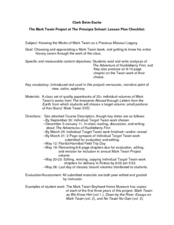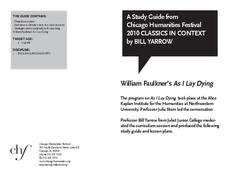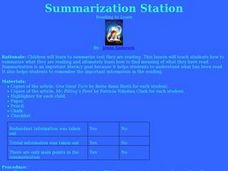Curated OER
Thanksgiving in America
A rhetorical look at Thanksgiving celebrations from all sides of the American dinner table.
Curated OER
To Recycle, or Not Recycle?
To recycle or not to recycle, that is the question. Your class can find the answer by taking a teacher created WebQuest, where they assume a role of a community member taking a stand on implementing a community wide recycling plan. The...
Curated OER
Adventures in Creating Hypertext Stories
Use hypertext to make a multimedia choose-your-own adventure story! Young writers incorporate knowledge of story writing elements to write their own stories, and rewrite the adventure with various scenarios and endings. Use technology to...
Curated OER
Planets in our Solar System
A wonderfully designed, and very thorough lesson plan on the planets in our solar system. Designed for third graders, this lesson has learners use technology and multimedia tools to research, explore, and create information about the...
Curated OER
Let Freedom Ring: The Life & Legacy of Martin Luther King, Jr.
Students use text and photos to visualize the delivery of Dr. Martin Luther King, Jr.'s historic "I Have A Dream" speech. They analyze Dr. King's speech for examples of imagery and allusion and create original poetry and illustrations...
Curated OER
Exploring Countries and Cultures
Fifth graders choose a country associated with a family member and research its location, government, language, economy, history, holidays, foods, sports, and famous people. They write to inform using this data and draw a map identifying...
Curated OER
What is the Nature of Science?
Conduct a survey about the nature of science with your high schoolers. They will record their responses in a table and then discuss the implications of scientific theory. Note: There are activity sheets, and forms included with this lesson.
Curated OER
Genetic Engineering
Students identify relationships between scientific concepts and their historical roots. They discuss and debate issues of ethics in science, specifically on the concept of genetic engineering and describe the processes of cloning and...
Curated OER
Revive, Contemplate, Integrate
Students recognize flags as a symbol through writing and imagery. In this artifact lesson, students investigate Tibetan prayer flags and their significance. Students create personal prayer flags and write about their life experience of...
Curated OER
Pardon Me. Do You Have Change For a Dollar?
Upper elementary and middle school learners explore currencies from a variety of countries. They use the Internet, video, and engage in hands-on activities. They practice converting U.S. currency to foreign currency and vice versa. This...
Curated OER
Native Americans in Arkansas: The Quapaw
The Quapaw Indians of Arkansas are the focus of this American history lesson plan. Learners discover many aspects of the Quapaw culture, such as their dwellings, social organization, food, and how the tribe was eventually driven out of...
Curated OER
Trail of the Cougar
Students examine cougar behavior, habitat, social organization, efforts to support their survival and the threats to it. They create posters to present information about cougars.
Curated OER
Won't You Celebrate With Me: The Joy of Lucille Clifton
Students explore the concept of poetry through movement and song. They watch Lucille Clifton read her poem, and write their own poem.
Curated OER
Why Mosquitoes Buzz in People's Ears
Students appreciate African folktales, make "connections" between geography and literature, and research facts about Africa's animals and present findings through art and writing.
Curated OER
Patriots of the Revolution
Fifth graders identify causes and effects of historical events in the American Revolution. They evaluate critical issues and events that led to the American Revolution. Analyze the views and lives of people of the Revolutionary Period.
Curated OER
Pictograph Robe Stories
Fourth graders explore the diversity and commonality of human interdependence. Also, the global cooperation of the people of the United States and the world through a multicultural and historical perspective. They describe the...
Curated OER
Pickles to Pittsburgh
Third graders explore the geography in the book "Pickles to Pittsburgh" by Judy Barrett. They read the story and identify the physical features of the town, discuss the elements included on a map, and create a map of the town of...
Curated OER
Get to Know Snow!
Students learn about snow. In this snow themed lesson, students read a book, make a painting, and observe snow. A math activity timing how long it takes for snow to melt is included.
Curated OER
The Mark Twain Project at the Principia School
Students read and write an analysis of The Adventure of Huckleberry Finn and write a paper on another Twain literary piece. For this Mark Twain lesson, students select a Mark Twain literary piece to write an analysis paper for the work....
Curated OER
William Faulkner's As I Lay Dying
Students analyze William Faulkner's As I Lay Dying. In this literature analysis lesson, students compare a modern novel and play. Students analyze Faulkner's interior monologues. Students write a paper about the ways As I Lay Dying is or...
Curated OER
Dealing with Disasters: Exploring a Cyclone Shelter
Students participate in reading activities to discover what a cyclone is and how cyclones affect those parts of the world that they hit. They discuss what kind of shelter would be best to create in anticipation of a cyclone.
Curated OER
PHONEMIC AWARENESS INFUSION
Students practice and utilize phonograms (word families) found in the patterns of frequently used words. They assess strategies to assist them in dividing long words as well as to develop their phonemic awareness to new vocabularies....
Curated OER
Pronunciation of Final Consonants
Pupils in ESOL classes discover how to recognize and pronounce final consonant sounds. With partners, they read passages aloud and practice the correct pronunciation. Students emphasize pronouncing the final consonant and attempt to...
Curated OER
Summarization Station
Learners observe and demonstrate a variety of strategies for summarizing text. They read and discuss the five steps of summarization, silently read an article, then observe the teacher write a summary paragraph for the article. ...


